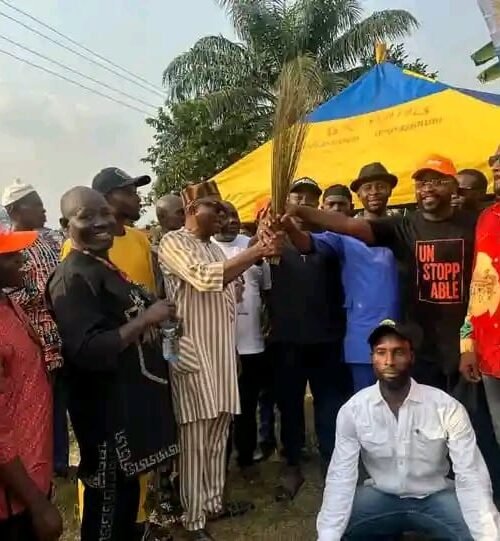ARICE Phase 1: Inside Governor Otti’s Agricultural Revolution
By Ebere Uzoukwa, PhD
Governor Alex Chioma Otti’s agricultural revolution in Abia State is fast gaining recognition as one of the most pragmatic and people-centred reforms in recent years. The completion of the first phase of the Abia Rice Intensive Cultivation and Expansion (ARICE) Programme represents more than a pilot project; it marks the beginning of a deliberate transformation aimed at achieving food sufficiency and repositioning Abia as a major agricultural hub.
The pilot phase, which covered 150 hectares of land in Owerrinta, Isiala Ngwa South, has already produced encouraging results with harvesting currently underway. Buoyed by this success, the government has announced plans to scale up the programme to 8,500 hectares across the state while introducing mechanized farming to enhance efficiency and productivity. This bold expansion reflects a clear strategy to move Abia from subsistence farming to large-scale production, positioning the state as a leading supplier of rice in the South East and a contributor to Nigeria’s wider food security agenda.
These achievements are not coincidental but rather a product of foresight and planning. They reflect the vision of Governor Otti, whose commitment to agriculture has been evident since the early days of his administration. Even before ARICE took off, his government had invested heavily in human capital development by sending 300 Abians, mostly young people, to the CSS Integrated Farms in Nasarawa State. There, they received training in mechanized farming, modern agricultural practices, and value addition. On their return, they were supported with interest-free loans to establish farms across the state. This dual strategy of training and empowerment ensured that knowledge was quickly translated into practice, creating a vibrant and growing network of productive farmers in Abia.
The testimonies of these beneficiaries speak volumes about the impact of the programme. One of them, Franklin Egbu, has become a notable figure in agro-processing, turning beans, soybeans, and plantains into flour and powder products now sold in supermarkets in Umuahia and distributed as far as Abuja and Lagos. Another beneficiary, Mrs. Ijeoma Daniel Nwachukwu, has built a thriving fish farm, already completing two production cycles and preparing for expansion. Similarly, Basil Emenike scaled up his rice cultivation and diversified into watermelon, cucumber, and potatoes while also mentoring farmers in his community. Others, such as Elijah Kalu and Chioma Onyekachi, have ventured into large-scale open-field farming of cassava, melon, and pumpkin. Perhaps most striking is the story of Victor Mbaegbu, who expanded his piggery from fewer than 500 to more than 800 within a single year of training and support.
These success stories are not isolated cases but part of a broader agricultural reawakening in Abia. They demonstrate that public investment under Governor Otti’s leadership is yielding returns not only in food production but also in job creation, entrepreneurship, and community development. Agriculture is no longer regarded as a peripheral sector but as a critical driver of economic growth. By combining production with value addition and opening the sector to private investment, the government is laying the foundation for a resilient agricultural economy capable of sustaining livelihoods and reducing dependence on external food supplies.
What is unfolding in Abia today is far more than a rice programme or an empowerment initiative; it is a holistic agricultural revolution. Governor Otti’s vision, backed by strategic planning and consistent investment, is breathing new life into farming and restoring confidence among farmers. With momentum building, Abia is well on its way to becoming a model state where agriculture is not merely a means of survival but a thriving industry that drives economic growth, secures food sufficiency, and uplifts communities.
Dr. Ebere Uzoukwa is the Senior Special Assistant to the Governor of Abia State on Public Affairs.






